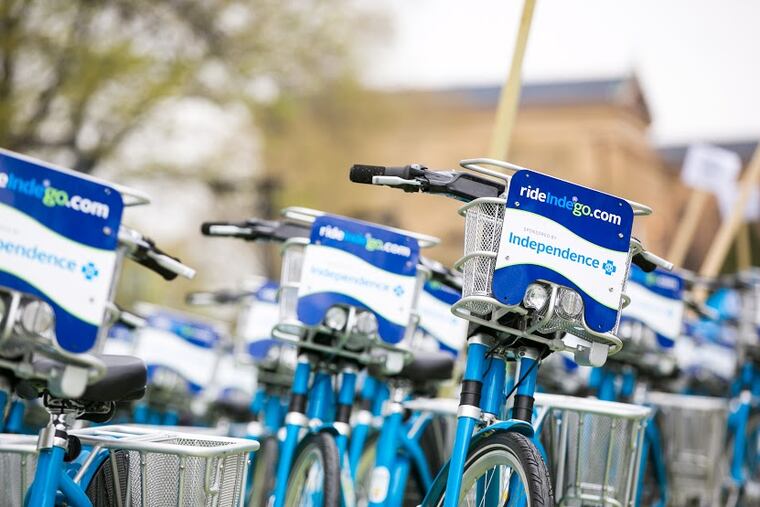E-bike setback shouldn’t detour Philly cycling | Editorial
The addition of speedy e-bikes to Philly's Indego bike share system proved immensely popular -- including, among riders who failed to return them.

Philly’s Indego bike share program has been a big hit since rolling out its distinctive blue-and-white fleet of 1,300 standard bicycles in 2015. E-bikes that utilize compact electric motors to boost pedaling power to 17 miles an hour were added in 2018 and became wildly popular as well, enabling older and less-athletic audiences to try cycling. But the e-bikes also were a runaway success in an unforeseen way: So many riders lost, forgot to return, or stole the $2,500 two-wheelers that the city has temporarily taken the fleet out of service and is bolstering fraud control and payment systems. The city declines to say how many among the 120 e-bikes available at last summer’s peak went missing; some were offered for sale online.
The e-bikes and their standard-pedal cousins are not outfitted with GPS for tracking purposes; the city Office of Transportation, Infrastructure and Sustainability (OTIS) has considered installing the devices but remains concerned about purchase, operational, maintenance, and enforcement costs. But given that e-bikes also have emerged as targets for thieves in Washington, D.C. and even armed robbers in New York City, GPS devices strike us as a necessary and worthwhile investment — especially given that the city hopes to put the fleet back on the street by March and grow it later this year to more than 200 e-bikes.
Advocates like the Bicycle Coalition of Greater Philadelphia characterize Philly’s e-bike thefts as a bump in the road as the city and the region work to encourage private cycling and bike-sharing, and to expand cycling infrastructure. But when renegades ride off into the sunset with expensive pieces of public property, that’s not exactly helpful in persuading a skeptical public that cycling should be an essential component of the region’s transportation system. The abrupt termination of a pilot bike-share program in Camden in 2018 also made headlines, although advocates faulted the vendor, not the concept.
» READ MORE: In Camden, bike sharing rolls out of town early
Meanwhile, construction of a long-promised network of protected bike lanes has been painfully slow in Philadelphia, where friction among drivers, riders, and pedestrians is all too common. Mayor Jim Kenney has spoken often about building more bike lanes and has said he wants his legacy to include as many as 40 miles of such infrastructure. Currently, there are about five miles, with perhaps 15 more expected to come online this year.
Cycling advocates say the politics and bureaucracy — construction of almost all protected bike lanes requires individual approvals by City Council, as well as involvement by multiple municipal departments — is cumbersome. And they characterize the community engagement as weighted more toward ameliorating the worries of the neighbors, rather than meeting the needs of the users, of the streets where protected lanes are to be built.
But friction and opposition are inevitable in a city of well-organized neighborhoods and idiosyncratic parking traditions, and where geography, density, and a compact street grid offer an opportunity for cycling to become essential to expanding options to get people where they need to go. E-bikes are a welcome addition to the system, but Philly must do a better job to protect the fleet ― and the public’s investment.